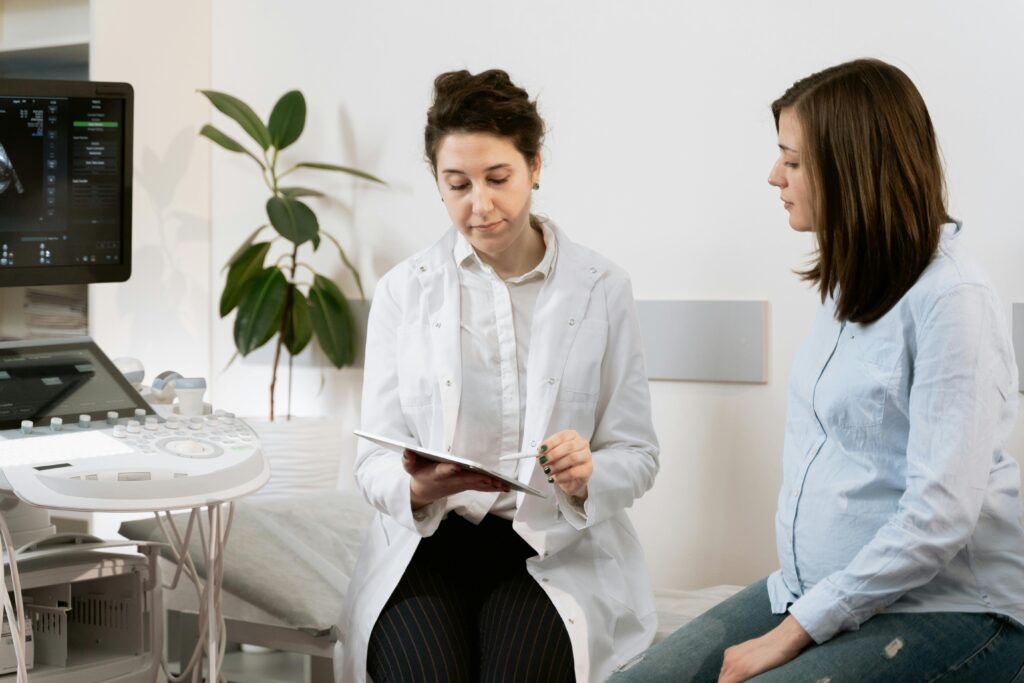Given the significant physical and psychological changes that occur during pregnancy, it is normal for pregnant moms to worry about both their own and their unborn child’s health. Bleeding after intercourse is one such worry that may surface. Peace of mind and wellbeing depend on knowing whether this is normal and when to seek medical assistance.
Reasons for Post-Sex Bleeding in Pregnancy
There are various reasons why a pregnant woman may bleed after having intercourse. Although it’s not always an indication of a major issue, it’s nevertheless vital to know what the possible causes could be:
Higher Sensitivity to Cervical Nerve: Hormonal changes during pregnancy lead to an increase in cervix sensitivity and vascularity. This indicates that when the cervix is stimulated, like during sexual activity, the blood vessels are more noticeable and more likely to bleed. Although minor bleeding or spotting may result from this increased sensitivity, it is usually not a reason for alarm. To rule out other problems, it’s advisable to let your healthcare physician know about any bleeding episodes.
Cervical Modifications: During pregnancy, the cervix experiences considerable modifications. It gets softer and has more blood flowing through it to sustain the developing pregnancy. It is more prone to bleeding and discomfort as a result of these modifications. The pressure and friction of intercourse might result in minor cervical bleeding. Usually minor, this kind of bleeding ends on its own. To make sure the bleeding isn’t a sign of something more dangerous, it’s critical to keep an eye on it and talk about it with your doctor.
Bleeding from Implants: Some women suffer implantation bleeding during the early stages of pregnancy, around the time the fertilized egg adheres to the uterine lining. This bleeding may be confused for sex-related bleeding during the early weeks of pregnancy. Most of the time, implantation bleeding is mild and transient. Even while minor bleeding during the early stages of pregnancy may be the result of implantation rather than sexual activity, it’s still advisable to speak with your doctor.
Either an infection or inflammation: Bleeding after sexual activity can be caused by vaginal infections, including bacterial vaginosis and yeast infections, as well as cervicitis, an inflammation of the cervix. The vaginal and cervical tissues may become inflamed as a result of these infections, making bleeding more likely. Infections must be treated right away in order to avoid problems and protect the mother’s and the child’s health. Infections might cause strange discharge, irritation, or an unpleasant smell. Get in touch with your healthcare practitioner for an assessment and the best course of action if you think you may have an infection.
Polyps: Benign growths called polyps can form in the vaginal canal or on the cervix. Normally benign, these growths have the potential to bleed if disturbed during intercourse. Your healthcare practitioner may advise monitoring or removal of any cervical or vaginal polyps if they cause severe bleeding or other problems. It’s crucial to attend all of your planned prenatal appointments because polyps can occasionally be found during these examinations.

When to Get Medical Help
Even though little bleeding or spotting after sex is usually not a reason for concern, there are few situations in which getting medical help is essential:
Excessive bleeding: Similar to menstruation, profuse bleeding may be a sign of a more serious problem, such as miscarriage or placental issues (placenta previa, placental abruption). Severe bleeding needs to be treated medically right away. In particular, if you experience pain, cramps, or contractions along with your heavy bleeding, get in touch with your healthcare practitioner or get to the closest emergency department.
Pain: Severe discomfort, cramps, or contractions along with bleeding may indicate preterm labor or other issues. Severe pain during or following sexual activity is abnormal and needs to be checked out by a medical professional. These signs may point to significant diseases that require immediate medical attention, such as uterine infections, preterm labor, or other illnesses.
Continuous Bleeding: Seek medical attention from your provider if the bleeding doesn’t stop for several hours or if it happens again after each session. Bleeding that does not stop may indicate an underlying problem that has to be treated. In order to identify the source of the bleeding and confirm that you and your child are healthy, your healthcare professional might advise tests or an examination.
Additional Signs: It’s important to pay attention to any worrying symptoms, such as fainting or dizziness, that accompany bleeding. These signs may point to severe bleeding or other dangerous illnesses that need to be treated right once. To protect your safety and wellbeing, get medical attention as soon as possible if you encounter any of these symptoms.

How to Proceed in the Event of Bleeding
Here are some actions you can take if bleeding occurs after sexual intercourse when you are pregnant:
Remain Calm: Although feeling anxious is normal, try to keep your cool. Light spotting is normal and usually not a reason for alarm. Breathe deeply and try to relax; stress and anxiety might make things worse. Recall that a large number of pregnant women who suffer light bleeding go on to have healthy pregnancies and babies.
Keep an eye on the bleeding: Take note of the bleeding’s quantity, color, and duration. Generally speaking, light pink or brown spots are less worrisome than strong red hemorrhage. Your healthcare professional can better diagnose the bleeding and administer the necessary treatment if they have a record of these data.
Avoid Sexual Activity: It could be a good idea to hold off on having sex until you have spoken with your doctor in order to avoid causing more agitation. In order to give any irritation or minor injuries time to heal, your provider may advise without having intercourse for a while. To protect your health and the health of your unborn child, heed their instructions.
Speak with your healthcare provider: Tell your doctor right away if you experience any bleeding while pregnant. They can offer tailored guidance and decide whether more assessment or testing is required. To determine the origin of the bleeding and make sure your pregnancy is proceeding appropriately, your doctor may use an ultrasound, pelvic exam, or other testing.

Preventive Actions
Even if bleeding cannot always be stopped, there are things you can do to reduce the risk:
Gentle Intercourse: Talk to your spouse about your comfort level and any pain or discomfort during gentle sexual activity. Being gentle can lessen the possibility of causing minor injuries that could result in bleeding or aggravating the cervix. Try out a variety of postures to see which one feels the most comfortable for you during pregnancy.
Frequent Prenatal Care: Your healthcare provider can monitor your pregnancy and treat any concerns swiftly if you attend all of your prenatal appointments. Frequent check-ups can help identify any possible problems early on and guarantee that you get the support and attention you need throughout your pregnancy.
Healthy Lifestyle: Keep yourself hydrated, eat a balanced diet, and abstain from activities that put you at higher risk of bleeding or other problems. A healthy pregnancy can be achieved by eating a balanced diet, drinking plenty of water, and avoiding activities that put you at danger of injury or heavy lifting.
Conclusion
While bleeding following sex during pregnancy can be concerning, it’s frequently not an indication of a major issue. It is possible to protect the health and safety of mother and child by being aware of the possible causes and knowing when to seek medical assistance. Throughout your pregnancy, if you have any concerns, always speak with your healthcare practitioner to obtain individualized attention and comfort. Maintaining a healthy, successful pregnancy and resolving any difficulties that may emerge require regular discussion with your healthcare professional.


